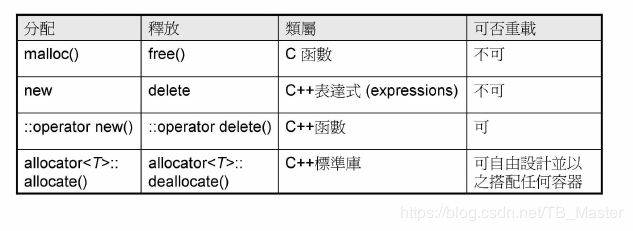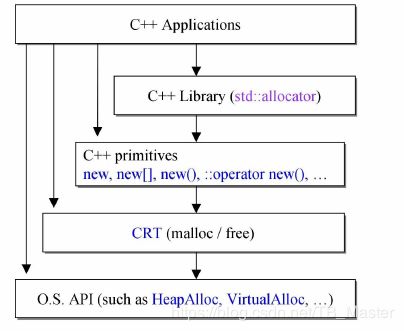- C++ Primer Plus 编程练习题 第二章 开始学习C++
MYX_309
C++PrimerPlus编程练习题c++开发语言学习
1.姓名和地址#includeusingnamespacestd;intmain(){stringname;cout>name;stringdress;cout>dress;coutusingnamespacestd;intmain(){intl;cout>l;intm=220*l;coutusingnamespacestd;voidmice(void){coutusingnamespacestd
- 记录C++学习 8 构造函数、析构函数、继承
MYX_309
跟着Cherno学C++c++学习算法
构造函数它的作用是初始化该类,当创建了一个新对象实例时,构造函数确保你初始化了所有内存,做了所有你需要做的设置引出#includeclassEntity{public:floatX,Y;voidPrint(){std::coutclassEntity{public:floatX,Y;voidPrint(){std::coutclassEntity{public:floatX,Y;Entity(){
- Lucene硬核解析专题系列(四):性能优化与调优
yinlongfei_love
lucene性能优化java
Lucene的高效性不仅源于其底层数据结构和算法,还得益于在实际应用中对性能的精心优化。本篇将从索引合并、内存管理、多线程搜索等方面,揭示Lucene如何应对高负载场景,并提供调优思路,帮助开发者充分发挥其潜力。一、索引合并(MergePolicy)与性能权衡Lucene的索引由多个分段组成,随着数据写入,分段数量增加会导致查询性能下降。索引合并是将小分段合并为大分段的过程,由MergePolic
- 青少年编程与数学 02-010 C++程序设计基础 22课题、自定义类型
明月看潮生
编程与数学第02阶段青少年编程c++编程与数学开发语言
青少年编程与数学02-010C++程序设计基础22课题、自定义类型一、类(Class)定义类使用类二、结构体(Struct)定义结构体使用结构体三、枚举(Enum)定义枚举使用枚举四、联合体(Union)定义联合体使用联合体五、类模板(ClassTemplate)定义类模板使用类模板六、类型别名(TypeAlias)使用`typedef`定义类型别名使用`using`定义类型别名七、异构类型(Va
- C++---STL标准库之string函数超长解析,十大常用函数全覆盖,轻松掌握,灵活运用,全面解决string字符串难题!
livercy
笔记c++c语言c#算法数据结构
STL---stringstring()定义string中内容的访问string常用函数string()定义在C语言中,一般使用字符数组charstr[]来存放字符串,但是使用字符数组有时会显得操作麻烦,而且容易因经验不足而产生一些错误。为了使编程者可以更方便地对字符串进行操作,C++在STL中加入了string类型,对字符串常用的需求功能进行了封装,使得操作起来更方便,且不易出错。如果要使用st
- Java内存管理与性能优化实践
向哆哆
Java入门到精通java性能优化python
Java内存管理与性能优化实践Java作为一种广泛使用的编程语言,其内存管理和性能优化是开发者在日常工作中需要深入了解的重要内容。Java的内存管理机制借助于垃圾回收(GC)来自动处理内存的分配和释放,但要实现高效的内存管理和优化性能,开发者仍然需要深入理解Java的内存模型、垃圾回收机制以及常见的性能瓶颈。本文将详细探讨Java内存管理的基本原理,并通过实际的性能优化实践,帮助开发者在开发过程中
- VS2022 C/C++配置bits/stdc++.h算法文件
wh0am1·
c语言c++算法
配置bits/stdc++.h文件。路径:D:\ProgramFiles\MicrosoftVisualStudio\2022\Professional\VC\Tools\MSVC\14.37.32822\include\bits\stdc++.h//C++includesusedforprecompiling-*-C++-*-//Copyright(C)2003-2013FreeSoftware
- c++中深拷贝和浅拷贝的联系和区别
已是上好佳
javajvm开发语言
在C++编程里,深拷贝和浅拷贝是两种不同的对象复制方式,它们在实现方式、资源管理和适用场景等方面存在显著差异。下面为你详细介绍它们的区别。1.基本概念浅拷贝:浅拷贝仅仅复制对象的成员变量值。对于基本数据类型(如int、double等),会直接复制其值;而对于指针类型的成员变量,浅拷贝只是复制指针的值(即内存地址),这就导致多个对象会共享同一块内存空间。深拷贝:深拷贝不仅会复制对象的成员变量值,当遇
- (一)c++调用自己编写的静态库
HawardScut
c-c++
c++调用自己编写的静态库1.静态库的介绍:一个静态库可以简单看成是一组目标文件(.o/.obj文件)的集合,静态库与汇编生成的目标文件一起链接为可执行文件。2.静态库的优缺点:(1)静态库对函数库的链接在编译时期完成,程序在运行时与函数库无关,移植方便。(2)所有相关的目标文件与牵涉到的函数库被链接合成一个可执行文件,浪费空间和资源。3.Demo实例:StaticMath.h#pragmaonc
- list的模拟实现
Stanf up
listc++
目录一、构造和扩容机制二、普通迭代器三、const迭代器四、tip有了前面vetcor的基础呢,我们在学习和使用list上就更加的方便快捷,浅显易懂了,所以相似的部分我就不做过多的言语阐述了,在使用方面呢,大家可以学习我之前看的c++网站,和vector和string的使用都是差不多的,重点要放在list的迭代器部分一、构造和扩容机制templateclasslist{typedeflist_no
- C++ STL <memory>
kyle~
C++STLc++
C++标准库中的头文件提供了一组与动态内存管理相关的工具,包括智能指针、内存分配器、对象构造与销毁的辅助工具等。这些工具极大地简化了动态内存管理,并提高了代码的安全性和可维护性。1.概述主要内容头文件主要包括以下内容:智能指针:std::shared_ptr、std::unique_ptr、std::weak_ptr。内存管理工具:std::allocator、std::uninitialized
- C++STL---<utility>
kyle~
C++STLc++开发语言
C++标准库的头文件提供了一组通用的工具函数、类型和模板,主要用于简化开发中的常见操作。1.概述主要功能库包含以下内容:类型辅助工具:如std::pair、std::tuple的支持。移动语义支持:如std::move和std::forward。交换操作:如std::swap。类型特性:如std::declval。其他工具:如std::make_pair、std::exchange等。头文件#in
- Rust语言基础知识详解【一】
学习两年半的Javaer
rustrust开发语言
1.在windows上安装RustWindows上安装Rust需要有C++环境,以下为安装的两种方式:1.x86_64-pc-windows-msvc(官方推荐)先安装MicrosoftC++BuildTools,勾选安装C++环境即可。安装时可自行修改缓存路径与安装路径,避免占用过多C盘空间。准备好C++环境后开始安装Rust:在RUSTUP-INIT下载系统相对应的Rust安装程序,一路默认即
- 性能巅峰对决:Rust vs C++ —— 速度、安全与权衡的艺术
m0_74825172
面试学习路线阿里巴巴rustc++算法
??关注,带你探索Java的奥秘!????超萌技术攻略,轻松晋级编程高手!????技术宝库已备好,就等你来挖掘!????订阅,智趣学习不孤单!????即刻启航,编程之旅更有趣!??在高性能计算的世界里,Rust与C++无疑是两位顶尖选手,它们各自拥有独特的魅力和强大的性能表现。本文将带你深入探讨这两门语言的性能对决,剖析它们的适用场景与背后的技术权衡,通过实例代码和详尽注解,为你揭示选择它们的智慧
- 使用PyQt5进行TCP和UDP通信及串口开发:C++实现详解
m0_57781768
qttcp/ipudp
使用PyQt5进行TCP和UDP通信及串口开发:C++实现详解引言在现代网络通信中,TCP(传输控制协议)和UDP(用户数据报协议)是两种最常用的传输层协议。TCP提供可靠的、面向连接的服务,而UDP则提供无连接的、不可靠的数据传输服务。PyQt5是一个非常流行的Python图形用户界面(GUI)框架,它不仅支持创建丰富的用户界面,还能用于网络通信和串口通信的开发。本文将详细介绍如何使用PyQt5
- 在 Ubuntu 下使用 rabbitmq-c 库进行 RabbitMQ 消息收发的完整示例代码如下
追心嵌入式
ubunturabbitmqc语言
在Ubuntu下使用rabbitmq-c库进行RabbitMQ消息收发的完整示例代码如下。这个示例将包括声明队列、绑定路由键、发送消息、消费消息等步骤,并且会包含错误处理。安装rabbitmq-c库首先确保已经安装了rabbitmq-c库。可以通过以下命令在Ubuntu上安装:sudoapt-getinstalllibrabbitmq-dev示例代码以下是一个简单的C++程序,展示了如何使用rab
- C++之,我是如何解决数据处理与算法难题的
一杯年华@编程空间
C++实战c++算法开发语言
C++之,我是如何解决数据处理与算法难题的在C++编程的世界里,我经历了无数次与代码“斗智斗勇”的过程,其中数据处理和算法应用方面的问题让我印象尤为深刻。今天,就和大家分享一下我在这方面遇到的挑战以及解决问题的方法。在一个数据处理项目中,我需要对大量的数值数据进行各种运算。例如,有一个包含员工绩效得分的数组,我需要计算这些得分的总和、平均值,还需要根据不同的权重计算加权总和,并且对数组进行一些变换
- sftp通信攻关——qt环境下使用c++实现
KyloChen
c++QT通信sftpssh2qtc++
最近涉及到sftp通信编码。上传测试代码记录一下。头文件:#ifndefSFTPMANAGER_H#defineSFTPMANAGER_H#ifdefWIN32#include"libssh2/win32/libssh2_config.h"#endif#include#include#include#include#include#include#ifdefWIN32#include#includ
- 在Qt中使用SmtpClient发送邮件
我啥都会
Qt开发C++qt开发语言发送邮件
前言邮件发送功能是一个非常常规的功能,Qt中貌似没有提供直接发送邮件的库,基于此,本文介绍一个发送邮件的库,用起来还不错。下载下载:在Qt中发送邮件的库。-C++文档类资源-CSDN下载发送邮件的库发送邮件的库发送邮件的库发送邮件的库发送邮件的库发送邮件的库发送邮件的库发送邮件的库发送更多下载资源、学习资料请访问CSDN下载频道.https://download.csdn.net/download
- C++ Qt login an https server, no use connect
m0_68739984
c++qthttps
IfyouwanttoperformanHTTPSlogininC++withQt,withoutusingtheconnectmechanism(whichisusuallyusedforevent-drivensignal-slotcommunication),youcanhandlethenetworkrequestsynchronouslyorwithaseparatethreadtoav
- c++面试常见问题:C ++内存管理
已是上好佳
c++算法开发语言
1.内存分区在C++里,内存主要分为以下几个区域:栈(Stack):由编译器自动分配和释放,用于存储局部变量、函数参数和返回地址等。其特点是内存分配和释放速度快,遵循后进先出(LIFO)原则。例如:#includevoidfunc(){inta=10;//变量a存储在栈上std::coutintmain(){int*ptr=newint(10);//在堆上分配内存std::coutintgloba
- 2024华为OD机试真题-荒岛求生(C++)-E卷B卷-100分
2024剑指offer
华为OD机试(C++)2025c++华为od
2024华为OD机试题库-(E卷+C卷+D卷)-(JAVA、Python、C++)目录题目描述输入描述输出描述示例1:示例2考点解题思路代码c++题目描述有一个荒岛,只有左右两个港口,只有一座桥连接这两个港口,现在有一群人需要从两个港口逃生,有的人往右逃生,有的往左逃生,如果两个人相遇,则PK,体力值大的能够打赢体力值小的,体力值相同则同归干尽,赢的人才能继续往前逃生,并减少相应的体力输入描述一行
- C++(四)类与对象 下
cloud_disspated
c++开发语言
再谈构造函数构造函数体赋值在创建对象时,编译器通过调用构造函数,给对象中各个成员变量一个合适的初始值classDate{public:Date(intyear,intmonth,intday){_year=year;_month=month;_day=day;}private:int_year;int_month;int_day;};虽然上述构造函数调用之后,对象中已经有了一个初始值,但是不能将其
- 【AI大模型应用开发】精读ToT:论文到源码,看透ToT思维树的实现流程
同学小张
大模型笔记经验分享人工智能AIGC思维树大模型
大家好,我是同学小张,持续学习C++进阶知识和AI大模型应用实战案例,持续分享,欢迎大家点赞+关注,共同学习和进步。上篇文章(【AI大模型应用开发】从CoT到ToT,再到ReAct,提升大模型推理能力的方式探索(含代码))我们学习了当下提高大模型推理能力的几个主要技术,从CoT(ChainofThought)到TOT(TreeofThought),再到ReAct。关于ReAct的实现方式,我们前面
- Python Cookbook-2.13 使用C++的类iostream语法
我不会编程555
#Python学习python开发语言windowsc++
任务C++的基于ostream和操纵符(插入了这种特定的对象后,它会在stream中产生特定的效果)的I/O方式,并想将此形式用在自己的Python程序中。解决方案Python允许使用对特殊方法(即名字前后带有连续两个下划线的方法)进行了重定义的类来重载原有的操作符。为了将>somewhere,"Theaverageof&dand&dis$f\n"%(1,3,(1+3)/2)这种方式是Python
- C++输入输出(新手教程)
Robots75
c++开发语言
目录前言C++的输入输出C++风格输入输出C风格输入输出前言在C++中,输入和输出是非常重要的。在洛谷中,几乎每到题都需要用到输入输出。这篇文章就是简单的给大家介绍了输入输出。C++的输入输出C++风格C++风格的cin和cout需要使用iostream库输入输入一个数的示例代码:#includeusingnamespacestd;intmain(){inta;cin>>a;return0;}解释
- C++输入输出语句
sir___sir6
c++开发语言
在C++中,常用的输入输出语句主要是通过iostream库提供的cin和cout。这些语句用于从控制台获取输入和向控制台输出内容cin:cin用于从控制台获取输入,通常与提供的变量结合使用。示例:intnum;cin>>num;//从控制台读取一个整数并存储在变量num中输出语句:cout:cout用于向控制台输出内容,可以输出变量的值、文本等。示例:intage=25;coutusingname
- 【C++知识点详解】深入理解C++线程池:原理、实现与应用指南
JuicyActiveGilbert
C++深度解析c++开发语言
一、线程池的本质与价值1.什么是线程池?线程池是一种并发编程的资源复用技术,通过预先创建一组可复用的工作线程,配合任务队列实现任务的自动化调度。其核心思想是"空间换时间":传统线程模式:任务到达→创建线程→执行任务→销毁线程线程池模式:预创建线程→任务入队→线程取任务→重复使用2.为什么需要线程池?对比维度传统线程模式线程池模式线程生命周期频繁创建/销毁一次创建长期使用资源消耗高(线程栈内存)稳定
- 第17天:深入理解C++友元函数 - 打破封装边界的可控通道
JuicyActiveGilbert
C++相关知识点c++开发语言
第17天:深入理解C++友元函数-打破封装边界的可控通道一、友元函数的本质与价值1.什么是友元函数?友元函数是C++中具有特殊访问权限的外部函数,能够直接访问类的私有(private)和保护(protected)成员。这是对OOP封装原则的有限突破,在保持封装性的同时提供灵活访问。2.为什么需要友元函数?场景常规方案友元方案运算符重载需要公有接口间接访问直接访问私有数据跨类协作增加中间层建立直接访
- 【C++保姆级入门】 变量 输出 输入
iecne
【C++入门】c++
首先介绍一下作者,CSDN新手,请多多关照此教程适合新手小白,因为语言会十分的通俗易懂,不会有很多的专业词汇出现,可以更好的掌握并且吸收,后续加上持之以恒的练习题目将会基本巩固一.基础结构在代码结构上,有两个比较重要的地方:头文件主函数#include//头文件,包括输入输出流的iostream库usingnamespacestd;//命名空间,默认使用std名字空间intmain(){retur
- 辗转相处求最大公约数
沐刃青蛟
C++漏洞
无言面对”江东父老“了,接触编程一年了,今天发现还不会辗转相除法求最大公约数。惭愧惭愧!
为此,总结一下以方便日后忘了好查找。
1.输入要比较的两个数a,b
忽略:2.比较大小(因为后面要的是大的数对小的数做%操作)
3.辗转相除(用循环不停的取余,如a%b,直至b=0)
4.最后的a为两数的最大公约数
&
- F5负载均衡会话保持技术及原理技术白皮书
bijian1013
F5负载均衡
一.什么是会话保持? 在大多数电子商务的应用系统或者需要进行用户身份认证的在线系统中,一个客户与服务器经常经过好几次的交互过程才能完成一笔交易或者是一个请求的完成。由于这几次交互过程是密切相关的,服务器在进行这些交互过程的某一个交互步骤时,往往需要了解上一次交互过程的处理结果,或者上几步的交互过程结果,服务器进行下
- Object.equals方法:重载还是覆盖
Cwind
javagenericsoverrideoverload
本文译自StackOverflow上对此问题的讨论。
原问题链接
在阅读Joshua Bloch的《Effective Java(第二版)》第8条“覆盖equals时请遵守通用约定”时对如下论述有疑问:
“不要将equals声明中的Object对象替换为其他的类型。程序员编写出下面这样的equals方法并不鲜见,这会使程序员花上数个小时都搞不清它为什么不能正常工作:”
pu
- 初始线程
15700786134
暑假学习的第一课是讲线程,任务是是界面上的一条线运动起来。
既然是在界面上,那必定得先有一个界面,所以第一步就是,自己的类继承JAVA中的JFrame,在新建的类中写一个界面,代码如下:
public class ShapeFr
- Linux的tcpdump
被触发
tcpdump
用简单的话来定义tcpdump,就是:dump the traffic on a network,根据使用者的定义对网络上的数据包进行截获的包分析工具。 tcpdump可以将网络中传送的数据包的“头”完全截获下来提供分析。它支 持针对网络层、协议、主机、网络或端口的过滤,并提供and、or、not等逻辑语句来帮助你去掉无用的信息。
实用命令实例
默认启动
tcpdump
普通情况下,直
- 安卓程序listview优化后还是卡顿
肆无忌惮_
ListView
最近用eclipse开发一个安卓app,listview使用baseadapter,里面有一个ImageView和两个TextView。使用了Holder内部类进行优化了还是很卡顿。后来发现是图片资源的问题。把一张分辨率高的图片放在了drawable-mdpi文件夹下,当我在每个item中显示,他都要进行缩放,导致很卡顿。解决办法是把这个高分辨率图片放到drawable-xxhdpi下。
&nb
- 扩展easyUI tab控件,添加加载遮罩效果
知了ing
jquery
(function () {
$.extend($.fn.tabs.methods, {
//显示遮罩
loading: function (jq, msg) {
return jq.each(function () {
var panel = $(this).tabs(&
- gradle上传jar到nexus
矮蛋蛋
gradle
原文地址:
https://docs.gradle.org/current/userguide/maven_plugin.html
configurations {
deployerJars
}
dependencies {
deployerJars "org.apache.maven.wagon
- 千万条数据外网导入数据库的解决方案。
alleni123
sqlmysql
从某网上爬了数千万的数据,存在文本中。
然后要导入mysql数据库。
悲剧的是数据库和我存数据的服务器不在一个内网里面。。
ping了一下, 19ms的延迟。
于是下面的代码是没用的。
ps = con.prepareStatement(sql);
ps.setString(1, info.getYear())............;
ps.exec
- JAVA IO InputStreamReader和OutputStreamReader
百合不是茶
JAVA.io操作 字符流
这是第三篇关于java.io的文章了,从开始对io的不了解-->熟悉--->模糊,是这几天来对文件操作中最大的感受,本来自己认为的熟悉了的,刚刚在回想起前面学的好像又不是很清晰了,模糊对我现在或许是最好的鼓励 我会更加的去学 加油!:
JAVA的API提供了另外一种数据保存途径,使用字符流来保存的,字符流只能保存字符形式的流
字节流和字符的难点:a,怎么将读到的数据
- MO、MT解读
bijian1013
GSM
MO= Mobile originate,上行,即用户上发给SP的信息。MT= Mobile Terminate,下行,即SP端下发给用户的信息;
上行:mo提交短信到短信中心下行:mt短信中心向特定的用户转发短信,你的短信是这样的,你所提交的短信,投递的地址是短信中心。短信中心收到你的短信后,存储转发,转发的时候就会根据你填写的接收方号码寻找路由,下发。在彩信领域是一样的道理。下行业务:由SP
- 五个JavaScript基础问题
bijian1013
JavaScriptcallapplythisHoisting
下面是五个关于前端相关的基础问题,但却很能体现JavaScript的基本功底。
问题1:Scope作用范围
考虑下面的代码:
(function() {
var a = b = 5;
})();
console.log(b);
什么会被打印在控制台上?
回答:
上面的代码会打印 5。
&nbs
- 【Thrift二】Thrift Hello World
bit1129
Hello world
本篇,不考虑细节问题和为什么,先照葫芦画瓢写一个Thrift版本的Hello World,了解Thrift RPC服务开发的基本流程
1. 在Intellij中创建一个Maven模块,加入对Thrift的依赖,同时还要加上slf4j依赖,如果不加slf4j依赖,在后面启动Thrift Server时会报错
<dependency>
- 【Avro一】Avro入门
bit1129
入门
本文的目的主要是总结下基于Avro Schema代码生成,然后进行序列化和反序列化开发的基本流程。需要指出的是,Avro并不要求一定得根据Schema文件生成代码,这对于动态类型语言很有用。
1. 添加Maven依赖
<?xml version="1.0" encoding="UTF-8"?>
<proj
- 安装nginx+ngx_lua支持WAF防护功能
ronin47
需要的软件:LuaJIT-2.0.0.tar.gz nginx-1.4.4.tar.gz &nb
- java-5.查找最小的K个元素-使用最大堆
bylijinnan
java
import java.util.Arrays;
import java.util.Random;
public class MinKElement {
/**
* 5.最小的K个元素
* I would like to use MaxHeap.
* using QuickSort is also OK
*/
public static void
- TCP的TIME-WAIT
bylijinnan
socket
原文连接:
http://vincent.bernat.im/en/blog/2014-tcp-time-wait-state-linux.html
以下为对原文的阅读笔记
说明:
主动关闭的一方称为local end,被动关闭的一方称为remote end
本地IP、本地端口、远端IP、远端端口这一“四元组”称为quadruplet,也称为socket
1、TIME_WA
- jquery ajax 序列化表单
coder_xpf
Jquery ajax 序列化
checkbox 如果不设定值,默认选中值为on;设定值之后,选中则为设定的值
<input type="checkbox" name="favor" id="favor" checked="checked"/>
$("#favor&quo
- Apache集群乱码和最高并发控制
cuisuqiang
apachetomcat并发集群乱码
都知道如果使用Http访问,那么在Connector中增加URIEncoding即可,其实使用AJP时也一样,增加useBodyEncodingForURI和URIEncoding即可。
最大连接数也是一样的,增加maxThreads属性即可,如下,配置如下:
<Connector maxThreads="300" port="8019" prot
- websocket
dalan_123
websocket
一、低延迟的客户端-服务器 和 服务器-客户端的连接
很多时候所谓的http的请求、响应的模式,都是客户端加载一个网页,直到用户在进行下一次点击的时候,什么都不会发生。并且所有的http的通信都是客户端控制的,这时候就需要用户的互动或定期轮训的,以便从服务器端加载新的数据。
通常采用的技术比如推送和comet(使用http长连接、无需安装浏览器安装插件的两种方式:基于ajax的长
- 菜鸟分析网络执法官
dcj3sjt126com
网络
最近在论坛上看到很多贴子在讨论网络执法官的问题。菜鸟我正好知道这回事情.人道"人之患好为人师" 手里忍不住,就写点东西吧. 我也很忙.又没有MM,又没有MONEY....晕倒有点跑题.
OK,闲话少说,切如正题. 要了解网络执法官的原理. 就要先了解局域网的通信的原理.
前面我们看到了.在以太网上传输的都是具有以太网头的数据包.
- Android相对布局属性全集
dcj3sjt126com
android
RelativeLayout布局android:layout_marginTop="25dip" //顶部距离android:gravity="left" //空间布局位置android:layout_marginLeft="15dip //距离左边距
// 相对于给定ID控件android:layout_above 将该控件的底部置于给定ID的
- Tomcat内存设置详解
eksliang
jvmtomcattomcat内存设置
Java内存溢出详解
一、常见的Java内存溢出有以下三种:
1. java.lang.OutOfMemoryError: Java heap space ----JVM Heap(堆)溢出JVM在启动的时候会自动设置JVM Heap的值,其初始空间(即-Xms)是物理内存的1/64,最大空间(-Xmx)不可超过物理内存。
可以利用JVM提
- Java6 JVM参数选项
greatwqs
javaHotSpotjvmjvm参数JVM Options
Java 6 JVM参数选项大全(中文版)
作者:Ken Wu
Email: ken.wug@gmail.com
转载本文档请注明原文链接 http://kenwublog.com/docs/java6-jvm-options-chinese-edition.htm!
本文是基于最新的SUN官方文档Java SE 6 Hotspot VM Opt
- weblogic创建JMC
i5land
weblogicjms
进入 weblogic控制太
1.创建持久化存储
--Services--Persistant Stores--new--Create FileStores--name随便起--target默认--Directory写入在本机建立的文件夹的路径--ok
2.创建JMS服务器
--Services--Messaging--JMS Servers--new--name随便起--Pers
- 基于 DHT 网络的磁力链接和BT种子的搜索引擎架构
justjavac
DHT
上周开发了一个磁力链接和 BT 种子的搜索引擎 {Magnet & Torrent},本文简单介绍一下主要的系统功能和用到的技术。
系统包括几个独立的部分:
使用 Python 的 Scrapy 框架开发的网络爬虫,用来爬取磁力链接和种子;
使用 PHP CI 框架开发的简易网站;
搜索引擎目前直接使用的 MySQL,将来可以考虑使
- sql添加、删除表中的列
macroli
sql
添加没有默认值:alter table Test add BazaarType char(1)
有默认值的添加列:alter table Test add BazaarType char(1) default(0)
删除没有默认值的列:alter table Test drop COLUMN BazaarType
删除有默认值的列:先删除约束(默认值)alter table Test DRO
- PHP中二维数组的排序方法
abc123456789cba
排序二维数组PHP
<?php/*** @package BugFree* @version $Id: FunctionsMain.inc.php,v 1.32 2005/09/24 11:38:37 wwccss Exp $*** Sort an two-dimension array by some level
- hive优化之------控制hive任务中的map数和reduce数
superlxw1234
hivehive优化
一、 控制hive任务中的map数: 1. 通常情况下,作业会通过input的目录产生一个或者多个map任务。 主要的决定因素有: input的文件总个数,input的文件大小,集群设置的文件块大小(目前为128M, 可在hive中通过set dfs.block.size;命令查看到,该参数不能自定义修改);2.
- Spring Boot 1.2.4 发布
wiselyman
spring boot
Spring Boot 1.2.4已于6.4日发布,repo.spring.io and Maven Central可以下载(推荐使用maven或者gradle构建下载)。
这是一个维护版本,包含了一些修复small number of fixes,建议所有的用户升级。
Spring Boot 1.3的第一个里程碑版本将在几天后发布,包含许多

